高中英语人教版必修五unit1单词讲解与拓展
人教版新课标 必修5 unit 1 单词讲解
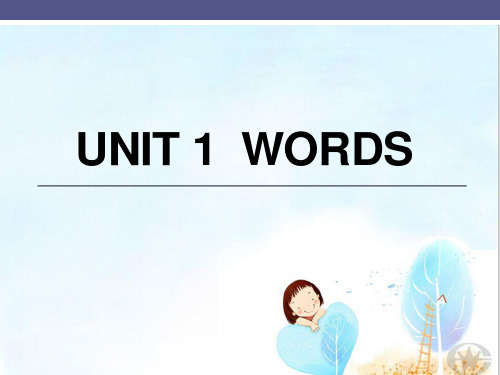
7. expose…to…
1.暴露于
Do not expose it to the sun.
To stay warm in cold weather,coldblooded animals must expose themselves to a source of warmth such as direct sunlight.
12, enthuse passion
[VI] to talk about something in a very interested or excited way
enthuse about/over
I want my colleagues to continue to enthuse about the job and teach effectively.
adj enthusiastic passionate
enthusiastic about (doing) something He's still really enthusiastic about his new job.
adv enthusiastically
enthusiastic
SYN
be absorbed in something
1.Eyes play an important role in body balance
and it is important
as much information
from the environment as possible.
2.He was
in eating, and his blond,
后面常接动名词的动词有:
acknowledge,admit,advocate,avoid, consider,contemplate,defer,delay, deny,dislike,enjoy,escape,evade, fancy,finish,imagine,include,keep, mind,miss,postpone,practise,recall,
人教版 高中英语 必修5 unit1 知识讲解 过去分词作表语和定语
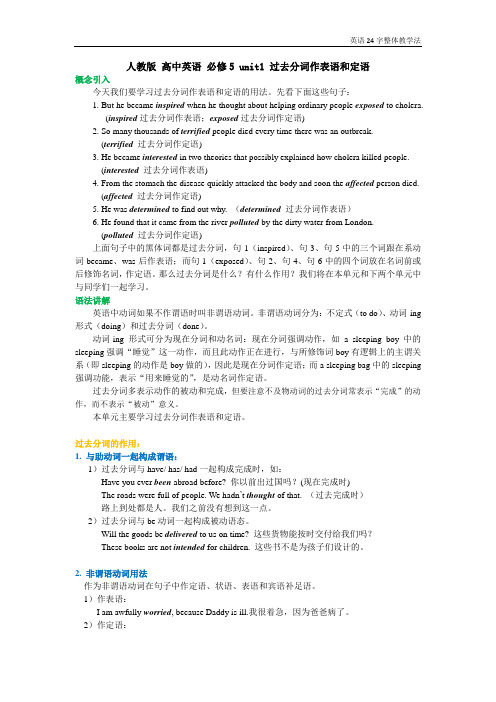
人教版高中英语必修5 unit1 过去分词作表语和定语概念引入今天我们要学习过去分词作表语和定语的用法。
先看下面这些句子:1. But he became inspired when he thought about helping ordinary people exposed to cholera.(inspired过去分词作表语;exposed过去分词作定语)2. So many thousands of terrified people died every time there was an outbreak.(terrified过去分词作定语)3. He became interested in two theories that possibly explained how cholera killed people.(interested 过去分词作表语)4. From the stomach the disease quickly attacked the body and soon the affected person died.(affected过去分词作定语)5. He was determined to find out why. (determined过去分词作表语)6. He found that it came from the river polluted by the dirty water from London.(polluted过去分词作定语)上面句子中的黑体词都是过去分词,句1(inspired)、句3、句5中的三个词跟在系动词became、was后作表语;而句1(exposed)、句2、句4、句6中的四个词放在名词前或后修饰名词,作定语。
那么过去分词是什么?有什么作用?我们将在本单元和下两个单元中与同学们一起学习。
语法讲解英语中动词如果不作谓语时叫非谓语动词。
人教版新课标必修5unit1单词讲解(共27张ppt)

优秀ppt公开课ppt免费课件下载免费 课件人 教版新 课标 必修5 unit 1 单词讲解(共27张ppt)
优秀ppt公开课ppt免费课件下载免费 课件人 教版新 课标 必修5 unit 1 单词讲解(共27张ppt)
12, enthuse passion
[VI] to talk about something in a very interested or excited way
enthuse about/over
complex and multi-dimensional
prcoopmosealudpurwinigththe spumrompiot.se
present
3.draw a csion =reach a conclusion
It would be unwise to draw firm conclusions from the results of a single survey.
6.infect Adj.
infect with
the number of people infected with Cholera.
Doctors say that the disease is most infectious in the first twenty-four hours.
infectious
Infectious adj. 传染性的, 感染的(尤指通过呼吸). (Spreading readily) Meaning : An infectious disease can be passed easily from one person to another, especially through the air they breathe .
高中英语人教版必修五unit1单词课件 共31张PPT
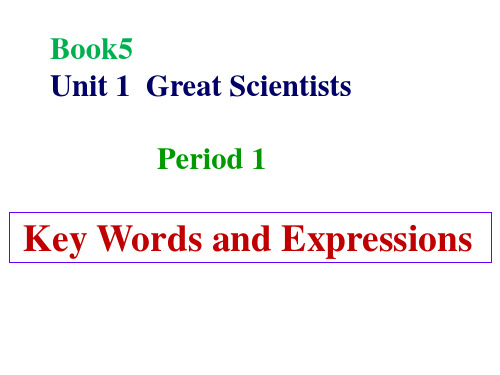
suspect 怀疑、觉察、嫌疑犯 suspect sb of (doing)sth怀疑某人某事 suspect sb to be 怀疑某人是…
suspect her of having stolen
blame vt.责备;谴责 n.过失;责备
blame sb. for sth./doing sth.因为某事责备某人
poem. •(2)As has been said above,we can conclude
that good manners are very important. •conclusion n. 结论,结束 •draw(make) a conclusion 得出结论 •做出那种结论太困难了。
•It is too difficult to make that conclusion. in conclusion 总之,概括来说
活学活用
1.将皮肤长时间暴晒在太阳下对身体有害。 E__x_p_o_s_in_g_ your skin _t_o__ the sun for long
does harm to your body.
2. 长期接触镭的人易患癌症。 People (often e_x_p_o__s_e_d _t_o___ the radium )
•In conclusion, I will say a few words about my
visit to NewYork. 最后,我对我的纽约之行说几句。
• defeat vt.打败;战胜;使受挫 n.失败
• They defeated the enemy in the battle. • 他们在那次战斗中打败敌人。
announce vt. 宣布,通告 政府颁布了新的经济政策。
人教版高二英语 必修五unit1 知识点
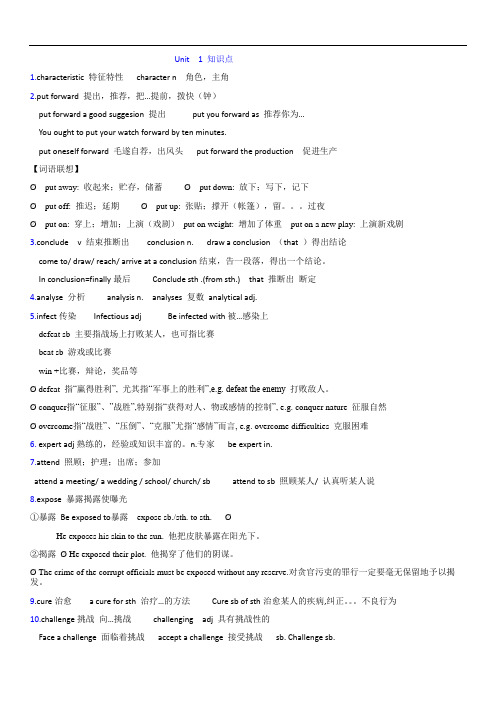
Unit 1 知识点1.characteristic 特征特性character n 角色,主角2.put forward 提出,推荐,把…提前,拨快(钟)put forward a good suggesion 提出put you forward as 推荐你为…You ought to put your watch forward by ten minutes.put oneself forward 毛遂自荐,出风头put forward the production 促进生产【词语联想】Ø put away: 收起来;贮存,储蓄Ø put down: 放下;写下,记下Ø put off: 推迟;延期Ø put up: 张贴;撑开(帐篷),留。
过夜Ø put on: 穿上;增加;上演(戏剧)put on weight: 增加了体重put on a new play: 上演新戏剧3.conclude v 结束推断出conclusion n. draw a conclusion (that )得出结论come to/ draw/ reach/ arrive at a conclusion结束,告一段落,得出一个结论。
In conclusion=finally最后Conclude sth .(from sth.) that 推断出断定4.analyse 分析analysis n. analyses 复数analytical adj.5.infect传染Infectious adj Be infected with被…感染上defeat sb 主要指战场上打败某人,也可指比赛beat sb 游戏或比赛win +比赛,辩论,奖品等Ø defeat 指“赢得胜利”, 尤其指“军事上的胜利”,e.g. defeat the enemy 打败敌人。
人教版英语必修5第1单元详尽单词讲解.doc

Vocabulary of Unit 5本单元单词多既可以做动词,乂可以做名词。
• characteristic n[c].特征;特性&仇".显著的;独特的 近义词:feanirc搭配be characteristic of ....... 表现。
的特点,是…。
所特有的区别character 性格,品质;性质;角色;特征(此时为不可数名词)e.g. The two groups of children have quite different characteristics.这两组儿童具有截然不同 的特点She spoke with characteristic enthusiasm.她说话带着特有的热悄The defiant manner is characteristic of teenagers.那种反抗态度是十几岁的青少年所特有 的。
• put forward 提出搭配put oneself/sb. forward (as...)自荐/捉名某人(为某职位的候选人)put sth. forward 提前某事;把(时钟)往前拨;提出某事e.g. He put forward a new plan.他捉出 了 一个新计划。
May I put your name forward as chairman of committee?我可以提名你当委员会主席吗?arrive at/come to/reach/draw a conclusion 彳导Hl 结论put 短语put aside 搁在一边(不去理会);储备put down 放下;镇压;丐下put off 延期put out 扑火,使熄火;生产put up 举起;搭建;张贴;留….住宿put on weight 发胖;增加体重 • conclude v.结束;推断出搭配 conclude (sth.) with....用 结束(某事)conclude ....... f rom 从 .... 中推断出 ....同源conclusion n.结论,决定;终结,结束 put in 插话 put away 收拾好;储存 put on 穿上;上演;假装 put through 接通(电话);完成;实行 put up with 容忍 put back 放回原处;拨回时钟;恢复正常in conclusion总而言之e.g. She concluded her speech with a quotation from Shakespeare.她引用莎士比亚的名言结束了演讲What do you conclude from that?从那你总结111 / 什么?I've come to the conclusion that he's not the right person for the job.我得出结论,他不是那份工作的合适人选In conclusion, walking is a cheap, safe, enjoyable and readily available form of exercise.总而言之,散步是一种便宜、安全、愉快、方便的锻炼方式•defeat v.打扮;战败;使受挫;n.失败辨析beat/defeat/winbeat/defeat的宾语是人或某个集体。
英语必修五unit1重点单词讲解
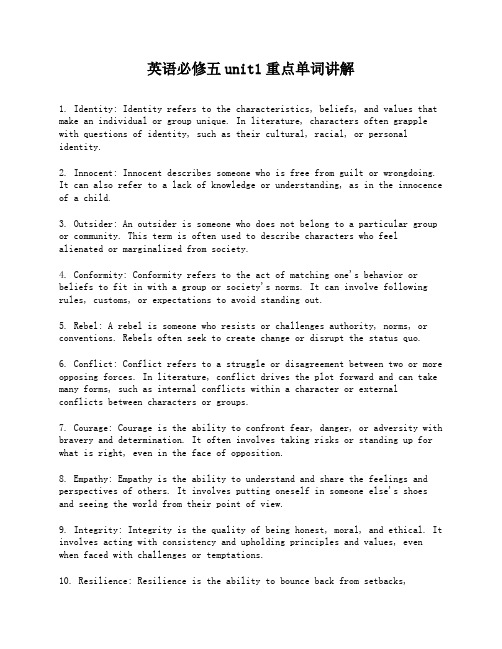
英语必修五unit1重点单词讲解1. Identity: Identity refers to the characteristics, beliefs, and values that make an individual or group unique. In literature, characters often grapple with questions of identity, such as their cultural, racial, or personal identity.2. Innocent: Innocent describes someone who is free from guilt or wrongdoing. It can also refer to a lack of knowledge or understanding, as in the innocence of a child.3. Outsider: An outsider is someone who does not belong to a particular group or community. This term is often used to describe characters who feel alienated or marginalized from society.4. Conformity: Conformity refers to the act of matching one's behavior or beliefs to fit in with a group or society's norms. It can involve following rules, customs, or expectations to avoid standing out.5. Rebel: A rebel is someone who resists or challenges authority, norms, or conventions. Rebels often seek to create change or disrupt the status quo.6. Conflict: Conflict refers to a struggle or disagreement between two or more opposing forces. In literature, conflict drives the plot forward and can take many forms, such as internal conflicts within a character or externalconflicts between characters or groups.7. Courage: Courage is the ability to confront fear, danger, or adversity with bravery and determination. It often involves taking risks or standing up for what is right, even in the face of opposition.8. Empathy: Empathy is the ability to understand and share the feelings and perspectives of others. It involves putting oneself in someone else's shoes and seeing the world from their point of view.9. Integrity: Integrity is the quality of being honest, moral, and ethical. It involves acting with consistency and upholding principles and values, even when faced with challenges or temptations.10. Resilience: Resilience is the ability to bounce back from setbacks,adversity, or difficult situations. It involves adapting to change, staying positive, and finding ways to overcome obstacles.11. Adversity: Adversity refers to difficulties, challenges, or obstacles that one may face in life. It can include hardships such as poverty, illness, or loss, and often tests one's resilience and character.12. Prejudice: Prejudice is a preconceived opinion or judgment about someone or something, usually based on stereotypes or incomplete information. Prejudice can lead to discrimination and unfair treatment of individuals or groups.13. Empowerment: Empowerment is the process of giving individuals or groups the authority, resources, and opportunities to take control of their own lives and make positive changes. It involves building confidence, skills, and self-esteem.14. Segregation: Segregation is the enforced separation of different racial, ethnic, or social groups, often through laws or policies. Segregation can lead to inequality and division within society.15. Oppression: Oppression refers to the unjust or cruel exercise of power and authority over others, often resulting in discrimination, exploitation, or mistreatment. It can take many forms, including systemic oppression based on race, gender, or class.16. Tolerance: Tolerance is the capacity to accept and respect the existence of opinions, beliefs, and behaviors that differ from one's own. It is a vital element in promoting understanding and harmony within diverse societies.17. Solidarity: Solidarity is the unity or agreement of feeling or action among individuals with a common interest or goal. It often involves standing together in support of a cause or in opposition to an injustice.18. Activism: Activism is the policy or action of using vigorous campaigning to bring about political or social change. Activists are often individuals who are passionate about addressing issues and advocating for change.19. Advocacy: Advocacy involves speaking, writing, or acting in support of a cause, policy, or person. An advocate is someone who actively promotes the interests or rights of others, often those who are marginalized or underrepresented.20. Altruism: Altruism is the selfless concern for the well-being of others.It is an unselfish action performed out of a desire to help, without any expectation of reward or recognition.21. Benevolence: Benevolence refers to the quality of being well-meaning, kind, and charitable. It is characterized by a desire to promote the happiness and welfare of others through acts of kindness and generosity.22. Enigma: An enigma is a person or thing that is mysterious, puzzling, or difficult to understand. In literature, enigmatic characters often have hidden depths or complexities that are gradually revealed over the course of a story.23. Isolation: Isolation is the state of being alone or apart from others. It can be a physical separation, but it can also refer to the feeling of being emotionally or socially isolated from others.24. Morality: Morality concerns principles of right and wrong behavior. It is the distinction between what is considered good or bad, right or wrong, in terms of an individual's conduct or character.25. Perseverance: Perseverance is the continued effort to do or achieve something despite difficulties, challenges, or setbacks. It is the steadfastness and determination to overcome obstacles and reach one's goals. 26. Renaissance: A renaissance is a period or movement marked by a revival of life, vigor, or interest in a particular area. It often involves a rediscovery or reevaluation of past achievements and a focus on innovation and progress. 27. Enlightenment: Enlightenment refers to the action of enlightening or the state of being enlightened. It is the process of gaining knowledge, understanding, and insight, often leading to personal growth and development.28. Liberation: Liberation is the act of setting someone free from oppression, confinement, or servitude. It can also refer to the feeling of being released from or relieved of burdens, constraints, or limitations.29. Renaissance: Renaissance is a cultural movement that spanned approximately from the 14th to the 17th century, characterized by a focus on humanism, a revival of classical learning and wisdom, and a commitment to the bettermentof society through education, arts, and sciences.30. Empiricism: Empiricism is the philosophical view that knowledge is derived primarily from sensory experience and observation. It emphasizes the importance of evidence and experimentation in the pursuit of understanding and truth.。
(人教版)高考英语课本考点课件:(必修5)Unit 1 Great scientists

Unit 1
Great scientists
说基础
SHUO JI CHU
课前预习读教材
基/础/梳/理
一、重点单词 1.conclude 论;结束 2.analyse 3.attend 席;照顾 vt.分析 analysis n.分析,报告 attendance n.出 vt. & vi.结束;推断出 conclusion n.结
n.过失;责备
It's wrong to lay the blame on him for delaying. 把延误的责任归咎于他是不对的。
We blamed him for his careless driving. 我们责怪他开车不小心。 They blame the failure on Mary. 他们把失败归咎于玛丽。 He is to blame in his matter. 他应该对这件事负责。 If you fail the exam, you will only have yourself to blame. 你若考试失败,只能怪自己。
4.absorb 入,同化
vt.吸引;吸收;使专心;使全神贯注;把……并
Dry earth absorbs water quickly. 干土吸水很快。 They absorbed a great deal of the Roman culture. 他们大量地吸收了罗马文化。 International affairs absorb his attention. 他专心研究国际问题。 The large firm absorbed the small ones. 那家大公司吞并了那些小公司。
announcer
announcement
